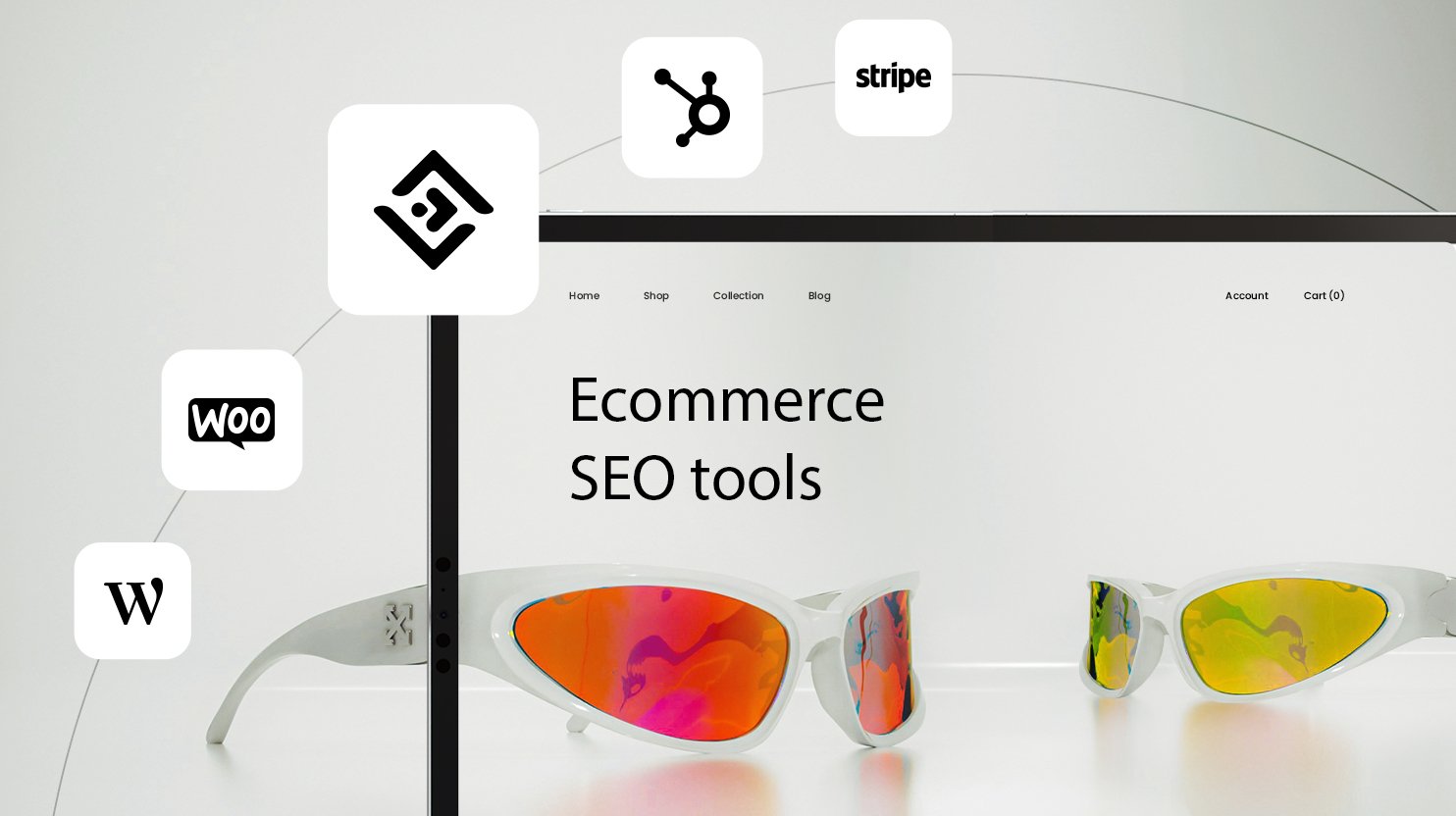Search Engine Optimization (SEO) is the number one tool for making your products visible to potential customers searching online. Ecommerce SEO tools help with keyword research, backlink analysis, and competitor insights, helping businesses optimize their content and strategies. There are tools that also analyze website performance, identify issues like slow loading speeds or broken links, and provide actionable suggestions to improve search engine rankings and user experience.
In this article, we’ll discuss 12 of the best ecommerce SEO tools, breaking down their features, pros, and cons to help you find the perfect one for your business. There’s never been a better time to optimize your store for search engines—it’s your chance to stand out, connect with more customers, and build a thriving business.
FAQ
What is an ecommerce SEO tool?
An ecommerce SEO tool is software designed to help online stores improve their visibility in search engine results. These tools assist with various aspects of SEO, such as keyword research, site audits, competitor analysis, and performance tracking. They provide valuable insights and actionable recommendations to optimize product pages, improve site structure, and enhance overall search engine rankings for ecommerce websites.
What are the types of ecommerce SEO tools?
There are several types of ecommerce SEO tools, each focusing on different aspects of optimization. Keyword research tools help find popular search terms for products. Site audit tools scan for technical issues affecting SEO performance. Competitor analysis tools provide insights into rival strategies. Other types include link-building tools for improving backlink profiles and rank-tracking tools for monitoring search result positions.
What are the best tools for ecommerce SEO?
Some of the best ecommerce SEO tools include Ahrefs, Semrush, and Moz Pro, which offer comprehensive features for keyword research, site audits, and competitor analysis. Google Search Console and Google Analytics provide valuable insights directly from Google. For specific tasks, tools like Screaming Frog (for technical SEO), Yoast SEO (for on-page optimization), and AnswerThePublic (for content ideas) are highly recommended.
Which ecommerce platform is best for SEO?
While the answer may vary depending on specific needs, many consider Shopify to be one of the best ecommerce platforms for SEO. It offers built-in SEO features, fast loading times, and mobile optimization. Other platforms like WooCommerce (for WordPress) and Magento also provide strong SEO capabilities. The best platform often depends on factors such as your technical skill level, budget, and specific business requirements.
How do I SEO for an ecommerce website?
To SEO an ecommerce website, start by optimizing product descriptions with relevant keywords and unique content. Improve site structure with clear categories and subcategories. Ensure your site is fast-loading and mobile-friendly. Use SEO tools to research keywords, analyze competitors, and track your performance. Regularly create high-quality content related to your products and industry to attract more organic traffic.
What are the top free options?
Top free ecommerce SEO tools include Google Search Console, which provides insights into your site’s search performance and issues. Google Analytics offers valuable data on user behavior and traffic sources. Google Keyword Planner helps with keyword research, while AnswerThePublic can generate content ideas based on popular searches. These tools, while free, offer powerful features to improve your ecommerce SEO strategy.
How to choose the right platform?
To choose the right ecommerce SEO platform, consider your specific needs and budget. Look for tools that offer comprehensive features like keyword research, site audits, and competitor analysis. Consider the size of your store and the level of technical expertise required to use the tool effectively. Read reviews, try free trials, and compare pricing plans to find the best fit for your business.
How to track SEO performance?
To track SEO performance for an ecommerce site, use tools that monitor your search engine rankings for targeted keywords. Google Analytics can show you organic traffic trends and conversion rates. Google Search Console provides data on click-through rates and impressions for your pages in search results. Regular site audits can help you track improvements in technical SEO factors over time.
Understanding ecommerce SEO
Ecommerce SEO helps online stores show up higher in search results. This brings more shoppers to your site and boosts sales. Good SEO makes it easier for customers to find your products when they search online.
SEO for online stores
SEO helps your products appear when people search for them. This means more traffic to your store without paying for ads. SEO also builds trust with customers. When your site ranks high, people see it as more credible.
Good SEO can give you an edge over competitors. It helps shoppers find you instead of competitors’ stores, which can lead to more sales and repeat customers. SEO also improves your site’s user experience, making shopping easier, faster, and more enjoyable for customers.
Key SEO strategies for ecommerce
Before using ecommerce SEO tools, there are strategies you can apply to help your online store’s ranking. Let’s see what those are:
- Product descriptions: Use keywords that shoppers search for. Ensure each product has a unique description with the keyword people are looking for. This helps search engines understand what you’re selling.
- Site structure: Group similar products together. Use clear categories and subcategories. This makes it easy for both customers and search engines to find things.
- Page speed: Fast-loading pages rank better and keep shoppers happy. Optimize your images and use a good hosting service to speed up your site.
- Mobile optimization: More people shop on phones now. Make sure your site works well on all devices. This improves rankings and the shopping experience.
Types of ecommerce SEO tools
Ecommerce SEO tools differ in purpose and type to help online stores improve their search rankings by improving different SEO areas. Let’s see what are the main types of ecommerce SEO tools.
- Keyword research tools: Let you find popular search keyphrases for your products. You can use these to optimize your product titles and descriptions.
- Site audit tools: Scan your online store for technical issues. They check things like page speed, broken links, and mobile-friendliness. Fixing these problems can boost your SEO performance.
- Competitor analysis tools: Show you what other online stores are doing. You can see which keywords they rank for and what backlinks they have. This info helps you spot opportunities to outrank them.
- Link-building tools: Help you get more sites to link to your store. More high-quality backlinks can improve your search rankings. Some tools find link prospects while others help you reach out to site owners.
- Rank tracking tools: Let you see how well your pages are showing up in search results. You can track specific keywords over time to measure your SEO progress.
Create your online store in minutes!
Looking to sell online? Develop and launch your store with 10Web AI Ecommerce Website Builder.
12 top ecommerce SEO tools
Before we discuss the ecommerce SEO tools, it’s important to recognize the role they play in driving your store’s success. With these tools, you can uncover actionable insights, simplify your optimization efforts, and stay ahead of the competition—all while connecting with more customers and boosting sales.
Ahrefs
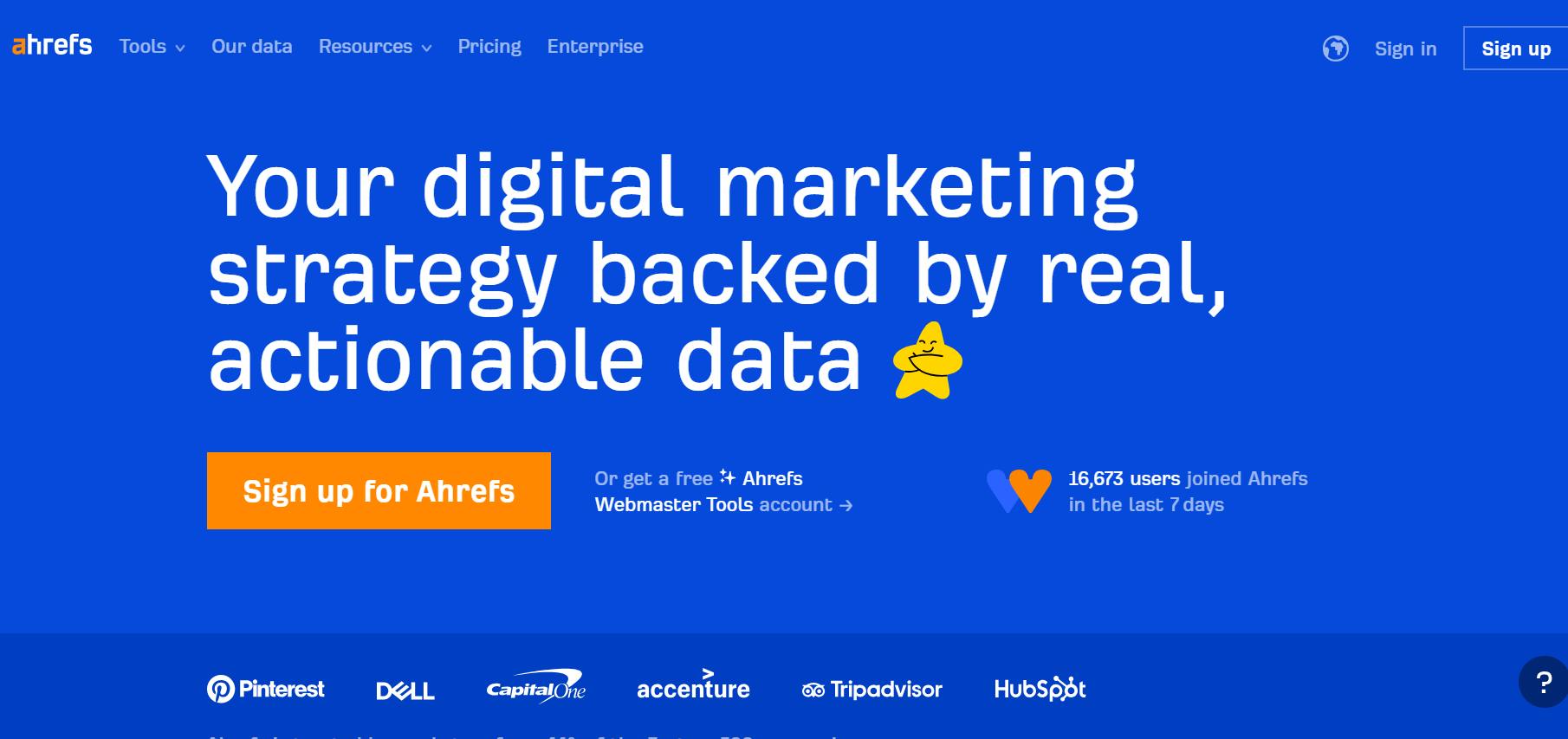 Ahrefs is a top choice for ecommerce SEO. You can use it to find keywords and check your site’s health. It shows you how your pages rank and what links point to them.
Ahrefs is a top choice for ecommerce SEO. You can use it to find keywords and check your site’s health. It shows you how your pages rank and what links point to them.
The tool offers a Site Explorer feature. This lets you see how your competitors are doing online. You can find out what keywords they use and how many backlinks they have.
Ahrefs also has a Content Explorer. It helps you find topics that people like to share. This can give you ideas for your own content. Also, the AI Content Helper analyzes your content based on the SERP and gives suggestions for improvement.
Many online stores use Ahrefs. It’s good for small shops and big brands alike. If you sell products online, this tool can help you get more traffic.
| Pros | Cons |
|---|---|
| Strong backlink analysis | Can be pricey for small businesses |
| Easy to use interface | Learning curve for new users |
| Good keyword research tools | Some features may be overkill for beginners |
Semrush
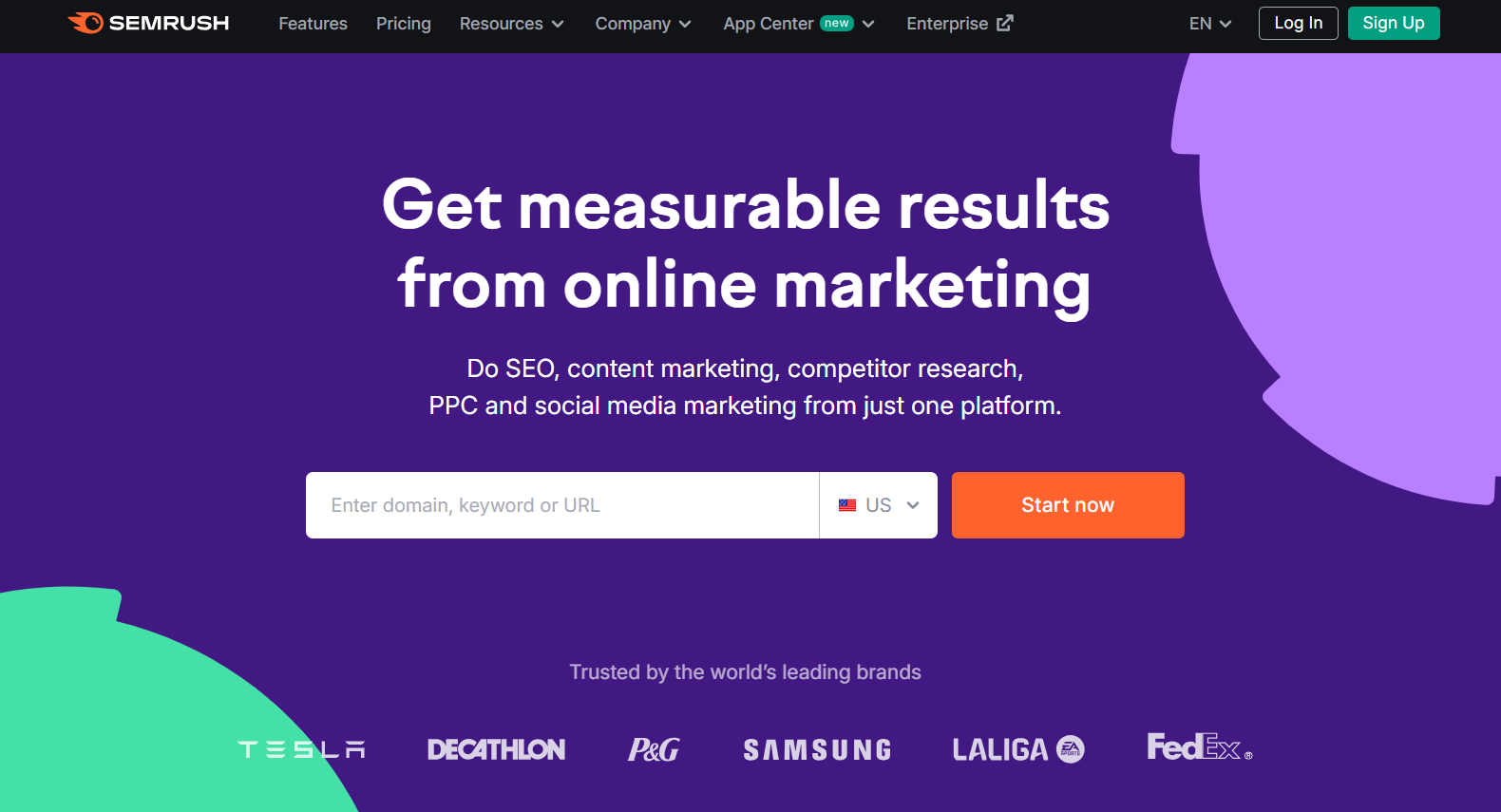 Semrush is a popular SEO tool for ecommerce businesses. It offers many features to help improve your online store’s search rankings. With Semrush, you can research keywords to target for your product pages and content. You can also analyze your competitors to see what’s working for them.
Semrush is a popular SEO tool for ecommerce businesses. It offers many features to help improve your online store’s search rankings. With Semrush, you can research keywords to target for your product pages and content. You can also analyze your competitors to see what’s working for them.
The tool provides site audits to find technical SEO issues on your ecommerce site. It helps you optimize your product descriptions and meta tags too.
Semrush is used by small online shops and large ecommerce brands alike. It’s good for businesses in retail, fashion, electronics, and more. This tool works well for companies selling both physical and digital products online. It can help new stores just starting out or established brands looking to grow.
| Pros | Cons |
|---|---|
| All-in-one SEO platform | Can be pricey for small businesses |
| Large keyword database | Learning curve for new users |
| Competitor analysis tools | Some features require higher-tier plans |
Moz Pro
 Moz Pro is a popular SEO tool that helps you improve your ecommerce website’s search rankings. It offers keyword research features to find terms your customers are searching for. You can use these insights to optimize your product pages and content.
Moz Pro is a popular SEO tool that helps you improve your ecommerce website’s search rankings. It offers keyword research features to find terms your customers are searching for. You can use these insights to optimize your product pages and content.
The tool includes a site crawler to check for technical issues that might hurt your SEO. It also provides link-building tools to help you get more backlinks to your online store.
Moz Pro is used by ecommerce businesses of all sizes, from small shops to large retailers. It’s especially helpful for companies selling products in competitive markets.
| Pros | Cons |
|---|---|
| Easy-to-use interface | Can be pricey for small businesses |
| Helpful keyword research tools | Learning curve for new users |
| Site audit features | Some features may be overkill for basic needs |
Screaming Frog
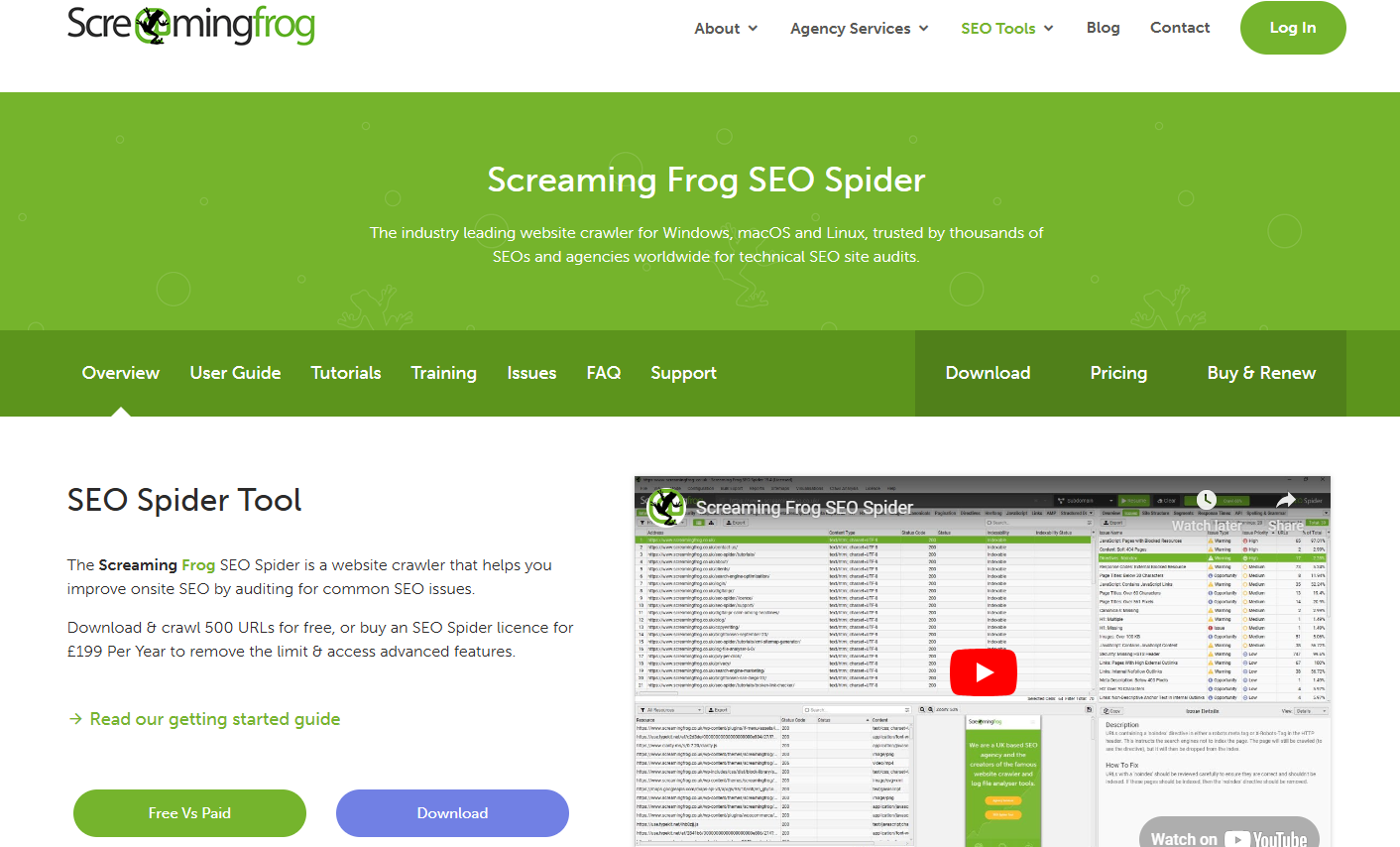 Screaming Frog SEO Spider is a tool that crawls websites to find technical SEO issues. It helps you spot problems that could hurt your site’s search rankings. You can use Screaming Frog to check things like broken links, page titles, and meta descriptions. It also looks at your site structure and finds duplicate content.
Screaming Frog SEO Spider is a tool that crawls websites to find technical SEO issues. It helps you spot problems that could hurt your site’s search rankings. You can use Screaming Frog to check things like broken links, page titles, and meta descriptions. It also looks at your site structure and finds duplicate content.
Many SEO pros and website owners use this tool to improve their sites. It’s popular in ecommerce, news, and any industry with large websites. Screaming Frog works well for medium to large online stores. It can handle big sites with lots of pages.
| Pros | Cons |
|---|---|
| Finds many types of SEO issues | Can be hard to learn at first |
| Works on big websites | Free version has limits |
| Saves time on manual checks | Might slow down your computer |
Yoast SEO
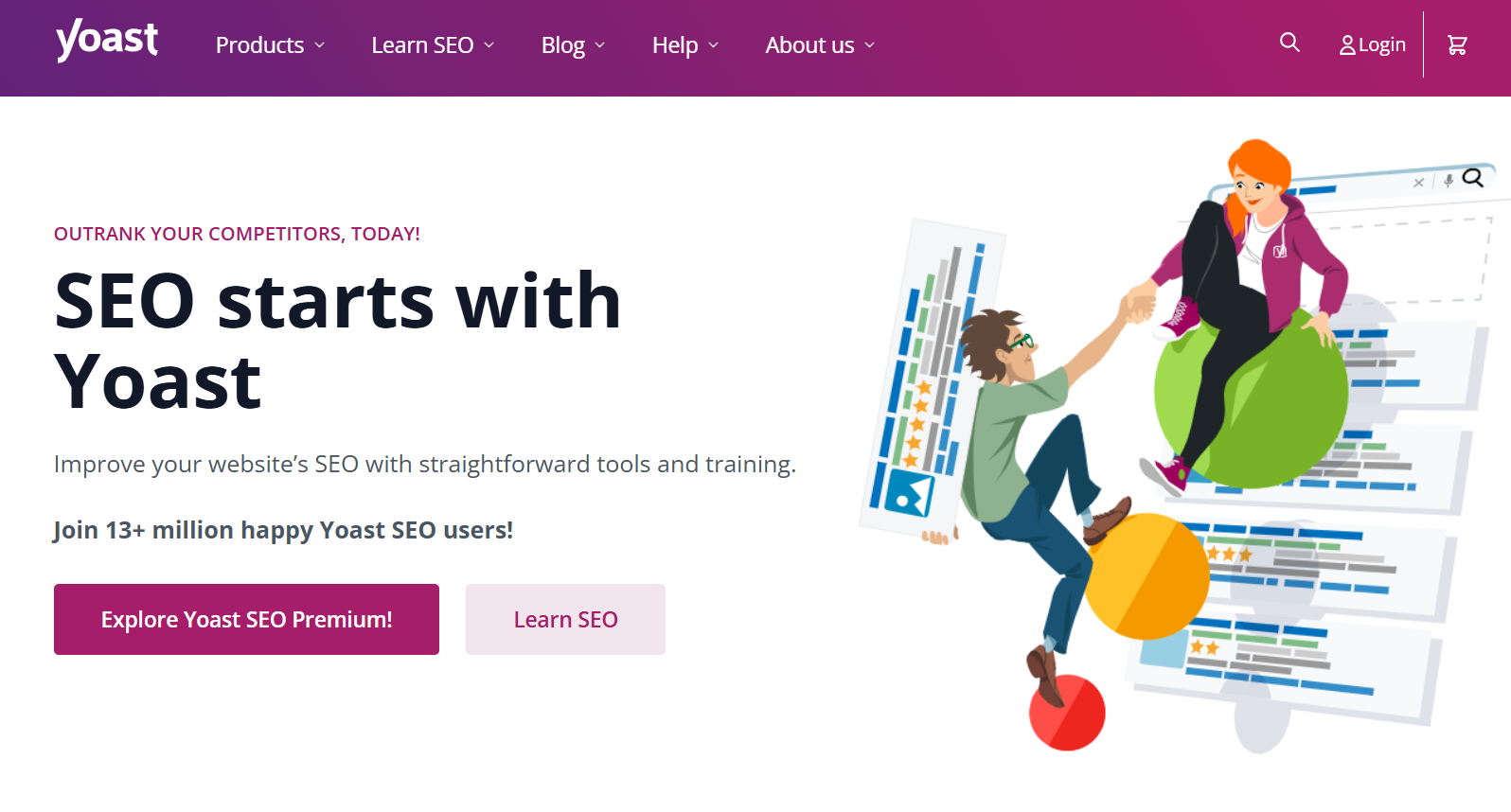 Yoast SEO is a popular WordPress plugin that helps you improve your website’s search engine rankings. It offers tools to optimize your content, meta descriptions, and titles for better visibility in search results.
Yoast SEO is a popular WordPress plugin that helps you improve your website’s search engine rankings. It offers tools to optimize your content, meta descriptions, and titles for better visibility in search results.
You can use Yoast SEO to add structured data to your pages, making it easier for search engines to understand your content. The plugin also helps you manage your site’s XML sitemaps and robots.txt file.
Yoast SEO is great for online store owners using WordPress. It integrates with WooCommerce to enhance your product pages’ SEO. You can easily add product details like brand, color, and identification numbers.
The free version of Yoast SEO offers many useful features. There’s also a premium version with extra tools for more advanced SEO tasks.
| Pros | Cons |
|---|---|
| Easy to use for beginners | Some advanced features require the paid version |
| Helps optimize content for search engines | Can slow down your website if not configured properly |
| Integrates well with WordPress and WooCommerce | May conflict with other SEO plugins |
Google Search Console
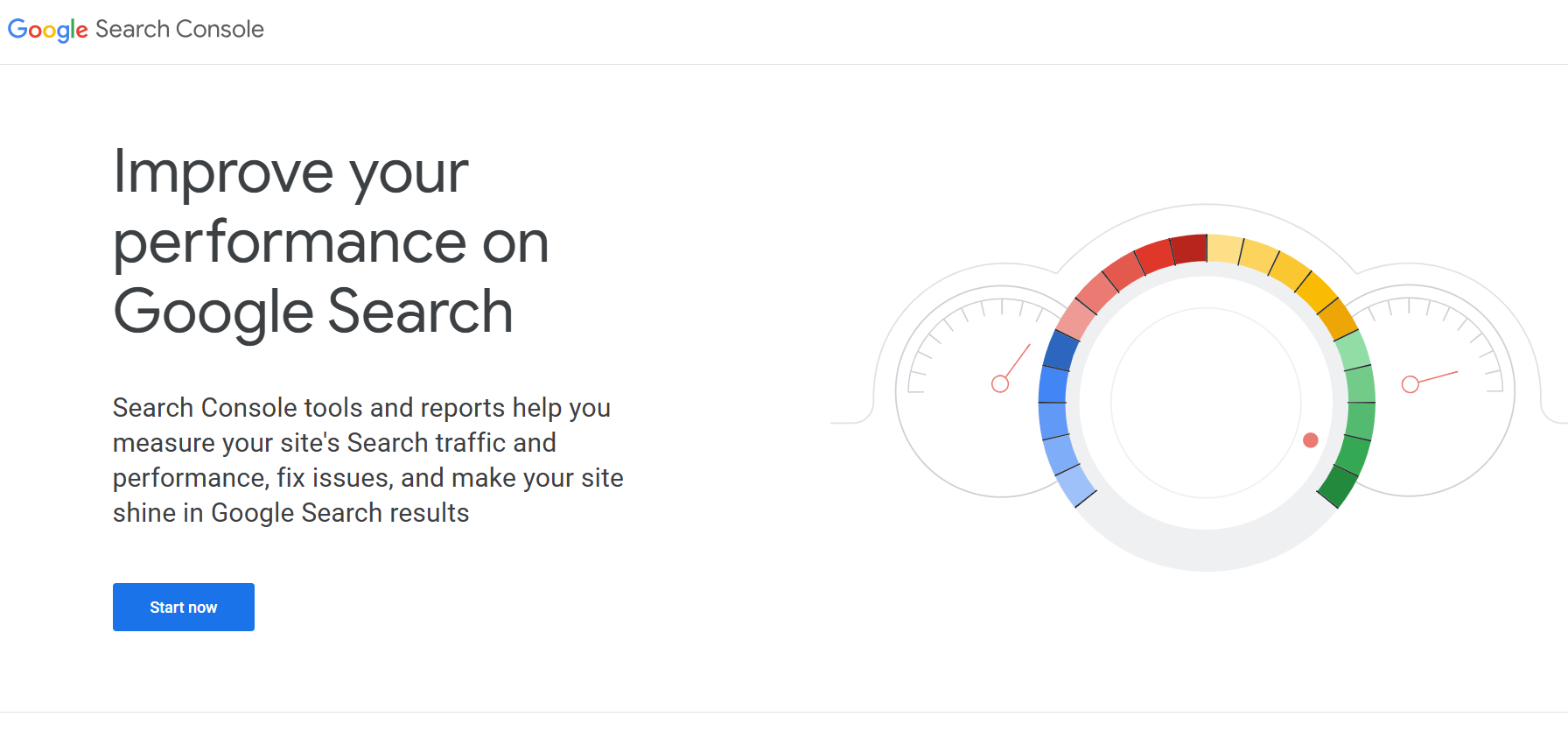 Google Search Console is a free tool that helps you improve your website’s performance in Google search results. It shows you how your site appears in search and lets you fix issues that might hurt your rankings.
Google Search Console is a free tool that helps you improve your website’s performance in Google search results. It shows you how your site appears in search and lets you fix issues that might hurt your rankings.
With Google Search Console, you can see which keywords bring people to your site. This helps you understand what your customers are looking for. You can also find out which of your pages get the most clicks from search results.
The tool alerts you to problems on your site, like broken links or mobile usability issues. It tells you if Google has trouble crawling or indexing your pages. You can use this info to make your site work better for both users and search engines.
| Pros | Cons |
|---|---|
| Free to use | Can be complex for beginners |
| Shows keyword data | Limited historical data |
| Helps find site errors | Some features need technical know-how |
Google Analytics
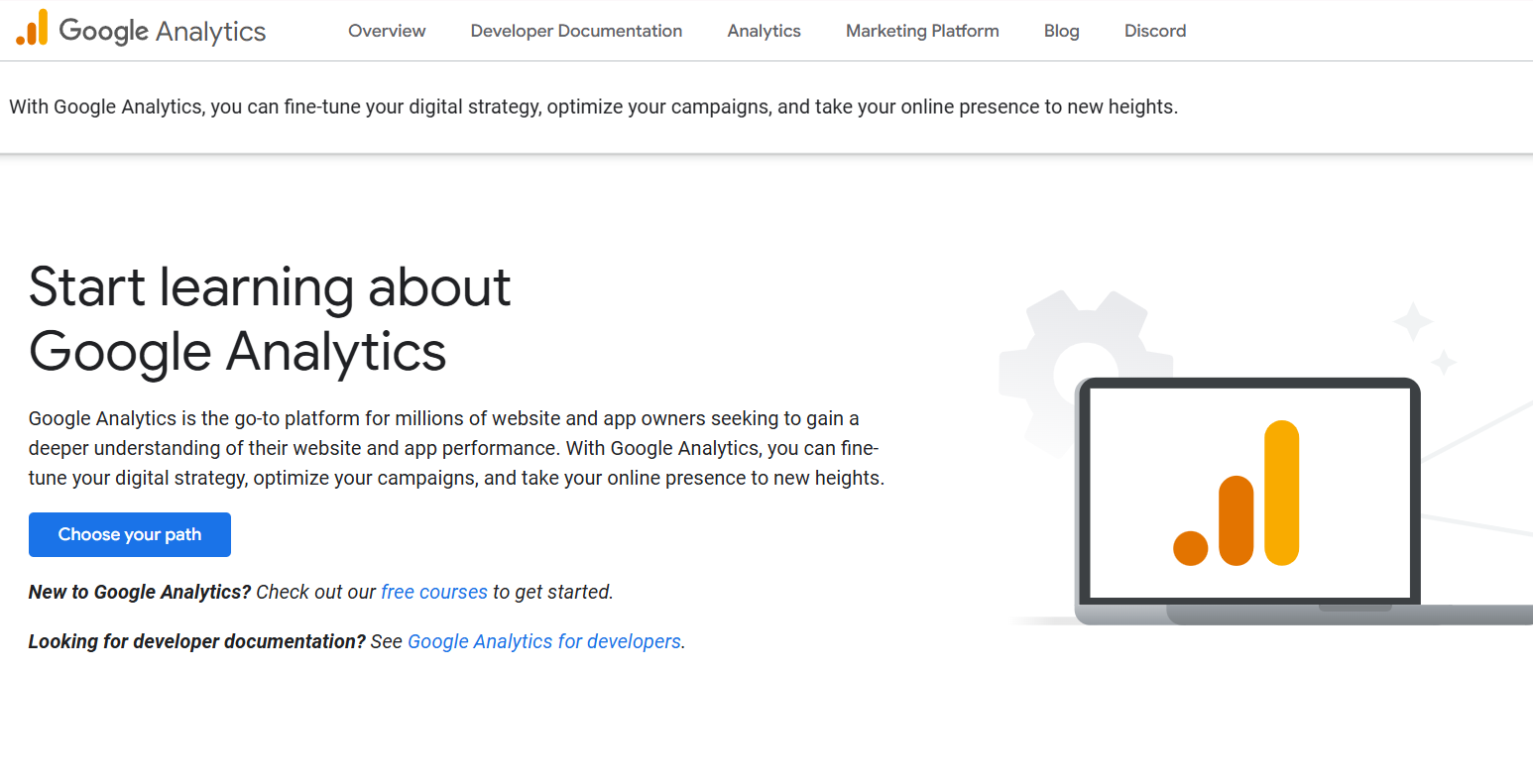 Google Analytics is a free tool that helps you track how people use your online store. It shows you where visitors come from and what they do on your site. You can see which products are popular and which pages people spend the most time on.
Google Analytics is a free tool that helps you track how people use your online store. It shows you where visitors come from and what they do on your site. You can see which products are popular and which pages people spend the most time on.
This tool gives you data about your customers. You can learn their age, gender, and interests. This helps you make better decisions about your products and marketing.
Google Analytics set-up is easy. You just add a small piece of code to your website. Then you can see reports about your store’s performance. Ecommerce businesses of all sizes use Google Analytics. It’s great for small shops and big retailers alike. You can use it to grow your online sales and improve your site.
| Pros | Cons |
| Free to use | Can be complex for beginners |
| Detailed reports | Requires some setup |
| Real-time data | Might need extra tools for deep analysis |
KWFinder by Mangools
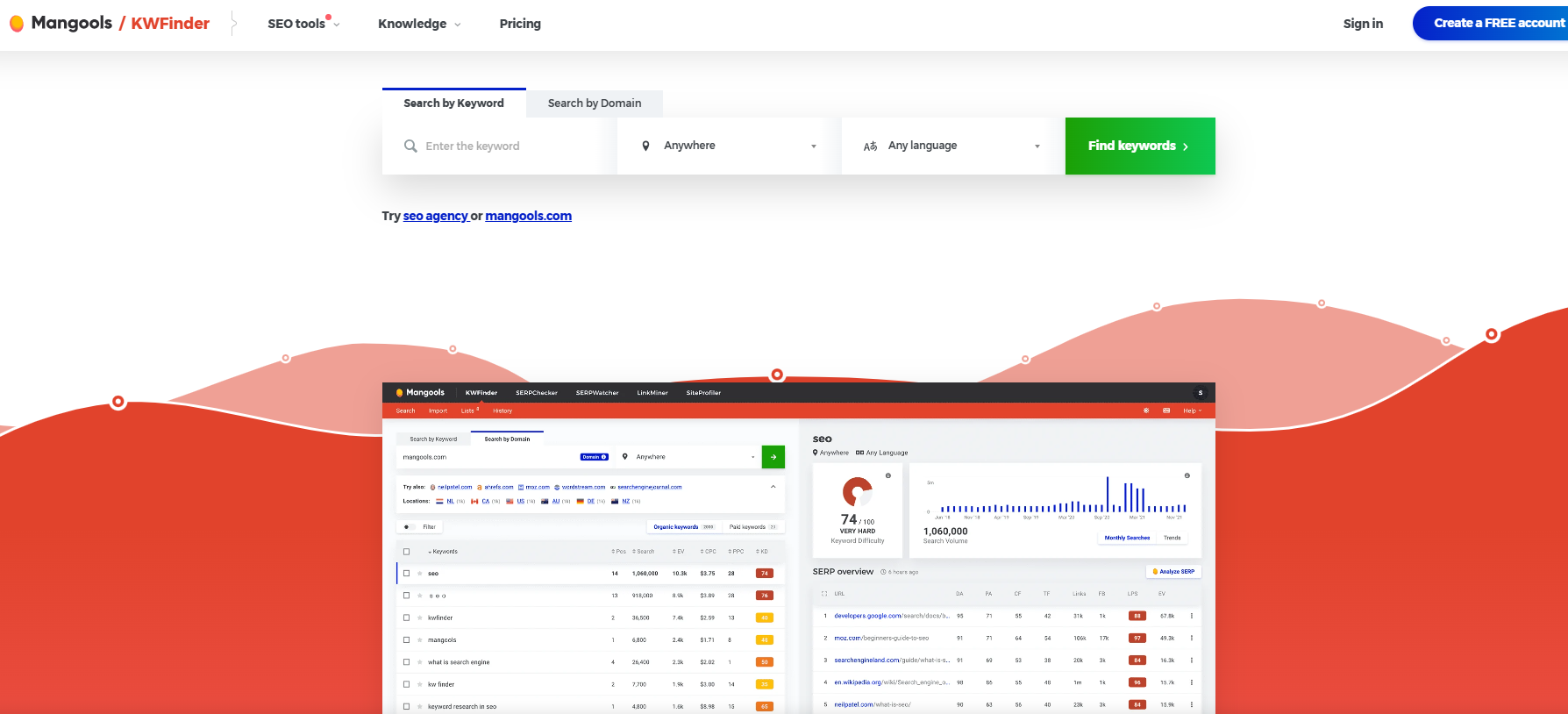 KWFinder is a popular keyword research tool for ecommerce businesses. It helps you find long-tail keywords that are easier to rank for in search results. This can give your online store an edge over competitors.
KWFinder is a popular keyword research tool for ecommerce businesses. It helps you find long-tail keywords that are easier to rank for in search results. This can give your online store an edge over competitors.
You can use KWFinder to discover keywords with low competition but good search volume. This makes it easier to create content that ranks well. The tool shows you keyword difficulty scores to guide your strategy.
KWFinder works well for small to medium ecommerce businesses. It’s helpful if you sell niche products and want to target specific customer searches. Many online retailers in fashion, home goods, and electronics use it. The tool is best for businesses just starting with SEO. Its simple interface makes keyword research less confusing for beginners.
| Pros | Cons |
|---|---|
| Easy to use interface | Limited features compared to all-in-one SEO tools |
| Finds long-tail keywords | Can be pricey for small businesses |
| Shows keyword difficulty scores | Focuses only on keyword research |
Ubersuggest
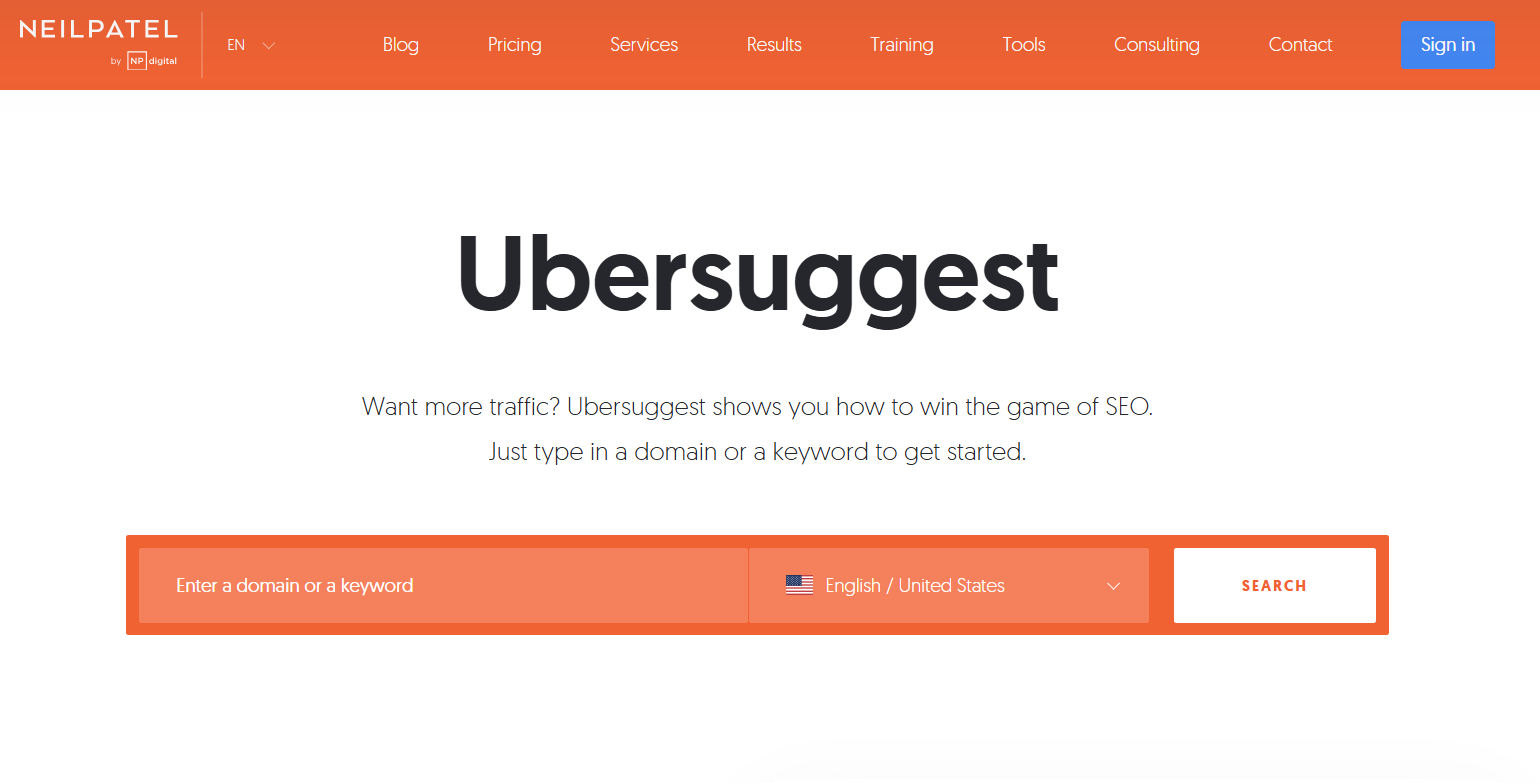 Ubersuggest by Neil Patel is a handy SEO tool for online stores. It helps you find good keywords for your products. You can use it to see what words people search for when looking to buy things like yours.
Ubersuggest by Neil Patel is a handy SEO tool for online stores. It helps you find good keywords for your products. You can use it to see what words people search for when looking to buy things like yours.
The tool shows you how hard it is to rank for each keyword. It also tells you how many people search for it each month. This helps you pick the best words to use in your product descriptions and web pages. Ubersuggest can check your website for SEO problems. It points out things you can fix to help your store show up better in search results.
You can use Ubersuggest to look at what your competitors are doing. It shows you what keywords they rank for and how much traffic they get. Small and medium-sized online stores often use this tool. It’s good for businesses that want to grow their online presence without spending too much money.
| Pros | Cons |
|---|---|
| Easy to use | Limited features in free version |
| Affordable paid plans | Less data than some bigger tools |
| Good for keyword ideas | May be too basic for large stores |
AnswerThePublic
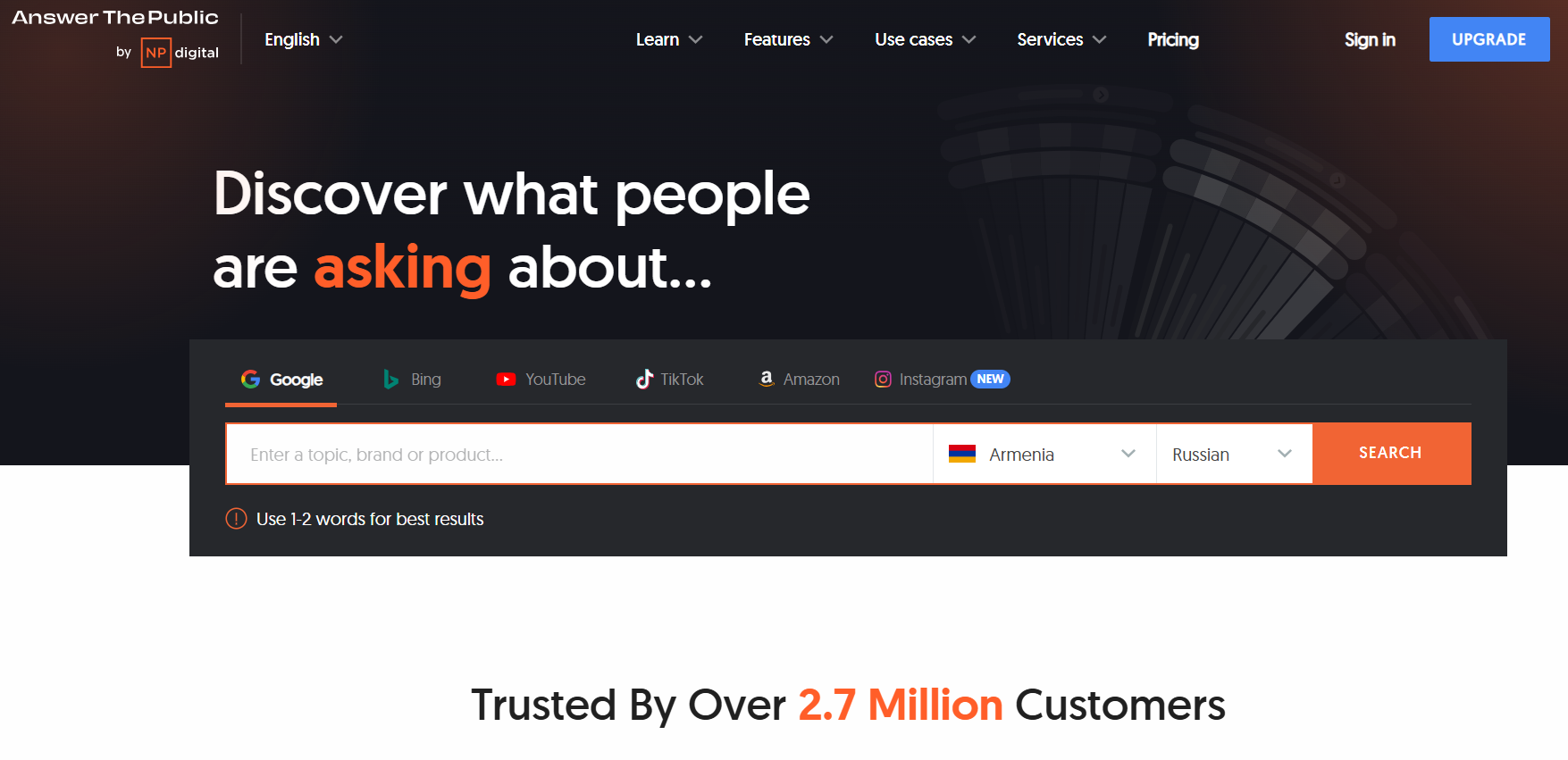 AnswerThePublic is a tool that helps you find popular questions and phrases people search for online. It takes your keyword and shows you what people want to know about it.
AnswerThePublic is a tool that helps you find popular questions and phrases people search for online. It takes your keyword and shows you what people want to know about it.
You can use this tool to create content that answers your customers’ questions. It’s great for ecommerce businesses looking to improve their SEO and attract more visitors. The tool is easy to use. You just type in a keyword, and it gives you a list of related questions and phrases. You can use these ideas to write blog posts, product descriptions, or FAQ pages.
AnswerThePublic offers different plans to fit your needs. You can choose from monthly or lifetime options.
| Pros | Cons |
|---|---|
| Easy to use | Limited free searches |
| Provides many content ideas | Some results may not be relevant |
| Affordable plans available | May require other tools for full SEO strategy |
Google Keyword Planner
 Google Keyword Planner is a free tool that helps you find keywords for your online store. It’s part of Google Ads but you don’t need to run ads to use it. You can use Keyword Planner to get ideas for new search terms. Just type in words related to your products, and it will suggest more keywords.
Google Keyword Planner is a free tool that helps you find keywords for your online store. It’s part of Google Ads but you don’t need to run ads to use it. You can use Keyword Planner to get ideas for new search terms. Just type in words related to your products, and it will suggest more keywords.
The tool shows you how often people search for different words. This helps you pick keywords that lots of people look for. You can see if searches for a word are going up or down over time. This lets you spot trends in what shoppers want.
Keyword Planner is good for small business owners and big companies. It works for all types of online stores.
| Pros | Cons |
|---|---|
| Free to use | Needs a Google Ads account |
| Shows search volume | Data can be broad |
| Offers keyword ideas | Focused on paid ads |
Majestic
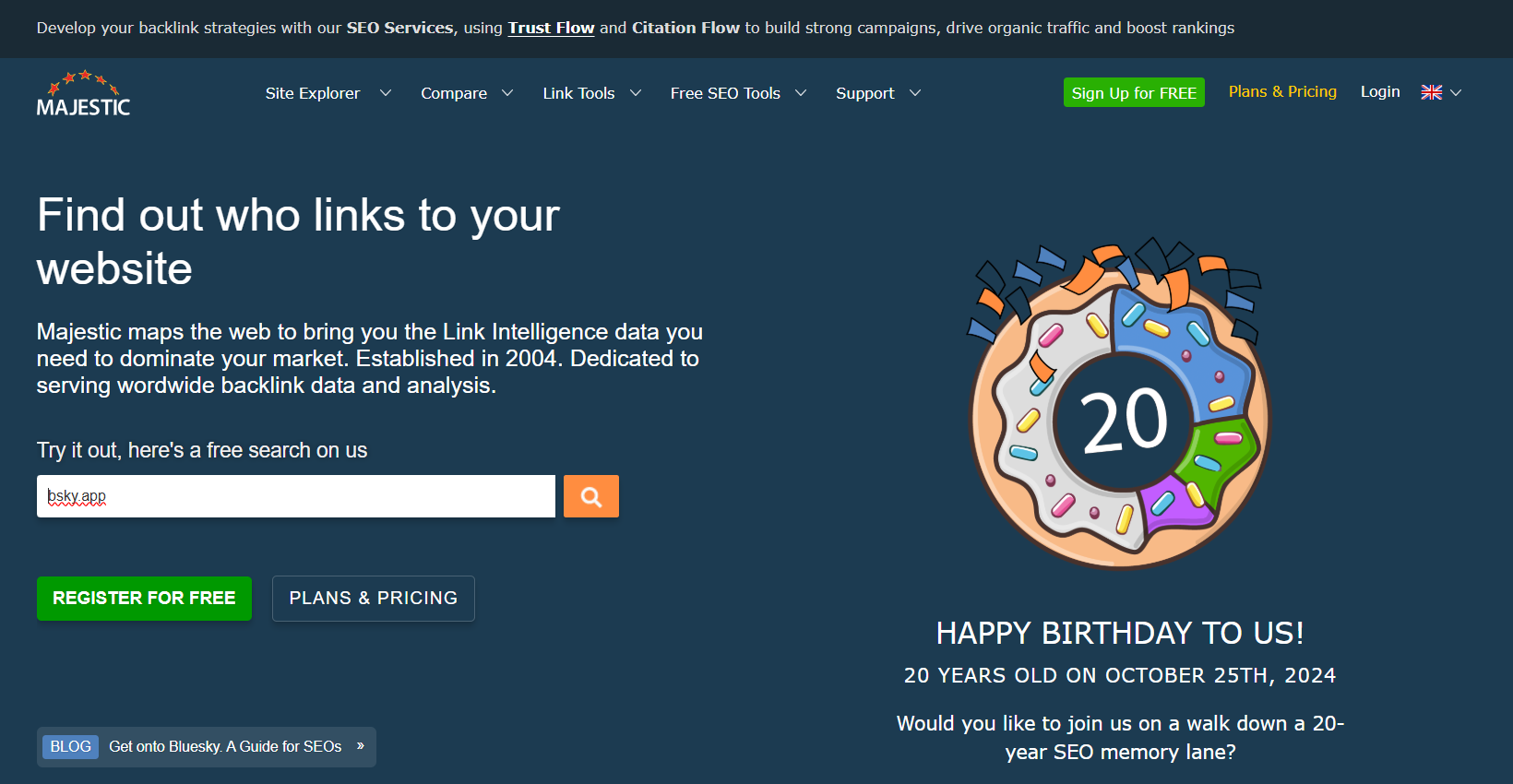 Majestic is a popular SEO tool that helps you analyze backlinks and improve your website’s search engine rankings. It offers a powerful link intelligence database to track your site’s link profile and compare it to competitors.
Majestic is a popular SEO tool that helps you analyze backlinks and improve your website’s search engine rankings. It offers a powerful link intelligence database to track your site’s link profile and compare it to competitors.
You can use Majestic to find new link-building opportunities and check the quality of your existing backlinks. The tool provides metrics like Trust Flow and Citation Flow to evaluate the strength and relevance of links.
Majestic is used by SEO professionals, digital marketers, and website owners who want to boost their organic search traffic. Ecommerce businesses rely on it to find authoritative sites for outreach and guest posting.
The tool works well for medium to large websites in competitive industries. It’s especially useful if link building is a key part of your SEO strategy.
| Pros | Cons |
|---|---|
| Large link database | Can be pricey for small businesses |
| Detailed link metrics | Steep learning curve for beginners |
| Competitor link analysis | No free plan available |
Conclusion
Today making your store visible on search engines is a must. The right ecommerce SEO tools can help boost your rankings, attract more visitors, and grow your business.
From finding the best keywords to fixing website issues and tracking your progress, these tools—like Ahrefs, Semrush, and even free ones like Google Search Console—make SEO easier and more effective. No matter the size of your business, there’s a tool to fit your needs.
Start using these tools now and watch your online store grow!

